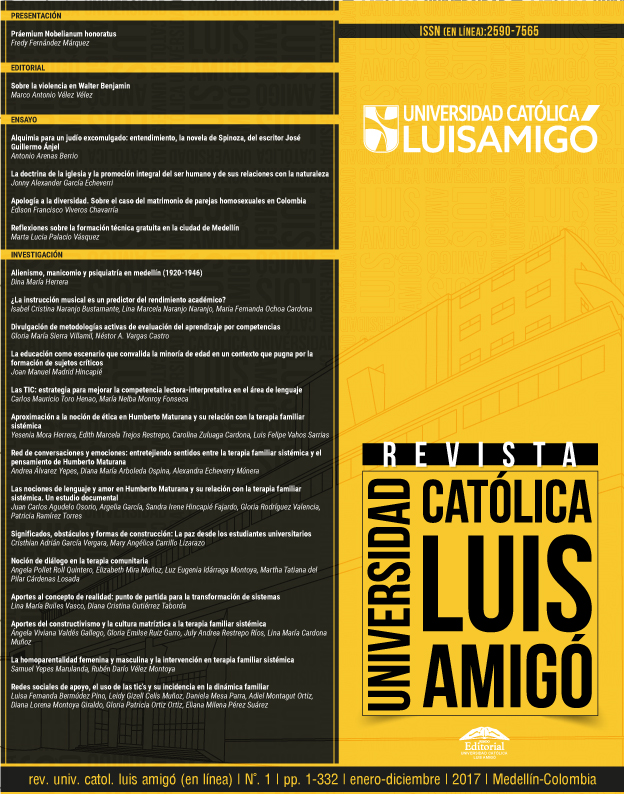Apology to diversity. On the case of the marriage of homosexual couples in Colombia
DOI:
https://doi.org/10.21501/25907565.2652Keywords:
Autonomy, Material conditions, Legal guarantees, Recognition, Moral philosophy.Abstract
This article discusses, in the context of moral philosophy, the marriage of homosexual couples in Colombia. The hypothesis of Reading is: the acceptance of sexual diversity in the conformation of homosexual couples by a decent society is directly related to the dignity and the capacity of recognition of this society in the field of moral philosophy. Repeatedly homosexuals have been treated as sick people, unable to assume a parent role or as people with rational deficiencies or with lack of moral and affective resources. people with rational deficiencies or absence of moral and affective resources. They are Accused of not being the result of the normal and expected life cycle of people; they are treated in humiliating and degrading ways, both in educational, labor, religious, and social environments. It is concluded that the way in which humiliation and contempt of homosexual couples and the LGBTI community is carried out has the peculiarity of being applied by a majority over a minority. Some people are openly discriminatory, others are in a frank rejection from their intimacies and others from their indifference. What is in question is us as a society and the way to make our moral deliberation.
Downloads
References
Albarracín, M. y Noguera, M. (2008). Derechos humanos de lesbianas, gays, bisexuales y transgeneristas en Colombia 2006-2007. Bogotá: Colombia Diversa.
Butler, J. (2010). Capacidad de supervivencia, vulnerabilidad, afecto. En Marcos de la guerra. Las vidas lloradas (pp. 57-94). México: Paidós.
Cofré, J. (diciembre 2004). Los términos “dignidad” y “persona”. Su uso moral y jurídico. Enfoque filosófico. Revista de Derecho, 17, 9-40.
Corte Constitucional de Colombia. (2002). Sentencia T-881/02 de 2002. Principio de dignidad humana.
Fajardo, L. (2005). Voces excluidas: legislación y derechos de lesbians, gays, bisexuales y transgeneristas en Colombia. Bogotá: Colombia Diversa.
Habermas, J. (2010). El concepto de dignidad humana y la utopía realista de los derechos humanos. 55 Dianoia, 64, 3-25 (mayo de 2010).
Honneth, A. (1992). Integridad y desprecio. Motivos básicos de una concepción de la moral desde la teoría del reconocimiento. Revista Isegoría, (5), 78-92.
Honneth, A. (1998). Entre Aristóteles y Kant. Esbozo de una moral del reconocimiento. Revista Logos: Anales del Seminario de Metafísica, (1), 17-37.
Kant, E. (2010). Fundamentos de la metafísica de las costumbres. México: Porrúa.
Margalit, A. (2010). La sociedad decente. Barcelona: Paidós.
Nussbaum, M. (2006). El ocultamiento de lo humano. Repugnancia, vergüenza y ley. Buenos Aires: Katz.
Quintero, Á. (2007). Diccionario especializado de familia y género. Buenos Aires: Hvmanitas-Universidad de Antioquia.
Restrepo, A. (2011). Acercamiento conceptual a la dignidad humana y su uso en la Corte Constitucional colombiana. Revista Electrónica Facultad de Derecho y Ciencias Políticas Universidad de Antioquia, 6(2), 1-19.
Downloads
Published
How to Cite
Issue
Section
License
PROPIEDAD INTELECTUAL
Los autores son moral y legalmente responsables del contenido de sus artículos, así como del respeto a los derechos de autor. Por lo tanto, éstos no comprometen en ningún sentido a la Universidad Católica Luis Amigó.
La reproducción de los artículos se regirá conforme a lo descrito en http://creativecommons.org/licenses/by-nc-sa/4.0/

